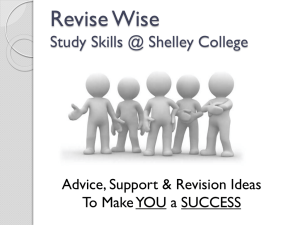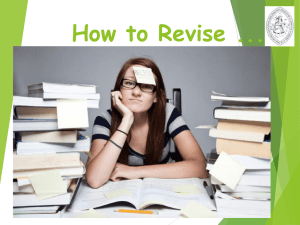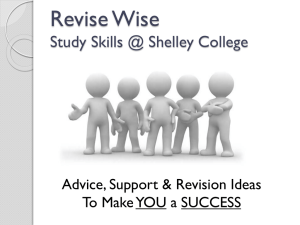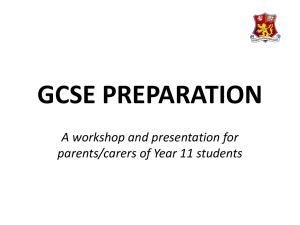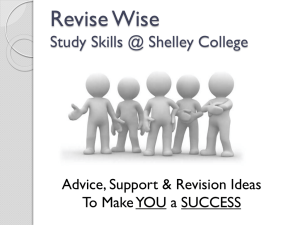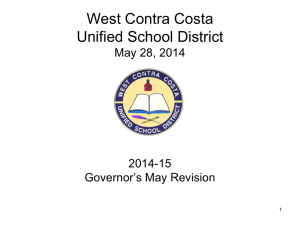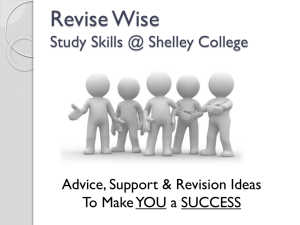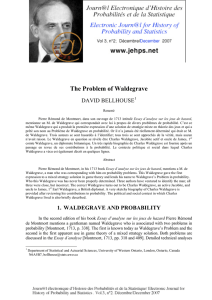Learning How to Revise Seminar
advertisement
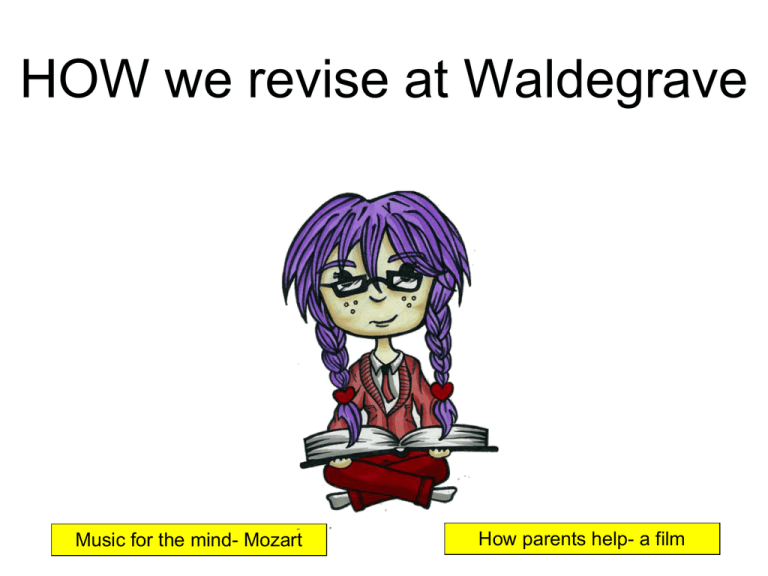
HOW we revise at Waldegrave Music for the mind- Mozart How parents help- a film Key points to cover this evening: • • • • • • • The purpose of Revision Effective Revision environments getrevising.co.uk Learning styles (VAK) Revision Techniques Transition to KS4/ PDC Top 10 mistakes we make when revising Knowledge •Facts •Figures •Equations & Formulae •Key quotes •Key people •Current Affairs •Historic events •List Understanding •Evaluation •Compare & Contrast •Synthesis •Discuss •Analyse •Application *Individual Learners Learning Environments Learning Environments Create an effective revision space • A clean, well equipped study environment helps revision. It removes distractions and promotes an organised approach to study...things you can include: • Creating a tidy undisturbed place to work • Having a comfortable chair, but not one you could fall asleep in (so no sofas, couches or bed!) • Using a table which gives enough room for books and to spread out etc • A bright lamp • Pens, pencils, other equipment including scrap paper • Warm (but not too warm that you get cozy and sleepy) getrevising.co.uk Waldegrave School has registered with the getrevising.co.uk website, which allows girls to : -Set up a personal profile -Enter their exam boards and exams (this information was sent home to each family) -Enter their Controlled Assessments and modular assessments (this information was also sent home to each family) -Devise a revision timetable -Investigate various learning/ revision help -Join study groups VAK- Visual, Auditory, Kinaesthetic Use coloured highlighter pens to mark your revision notes. You should identify key words (these may be names, dates, places, etc.) You could even use different colours for different types of information. You might find it helpful to play soothing music as you revise. Experts suggest that some types of music (particularly with a tempo of 58-60 beats per minute) can help you learn more effectively. However, music at a faster tempo or music with a strong lyric can have a distracting effect. In the margins of your subject notebook, draw sketches or cartoons that relate to that particular topic or paragraph. These will not only help you to locate that particular section but will also make it more memorable. Record key points on an audio file and play them over, especially just before you sleep. Identify key points and try to make these into a rhyme, rap or song. This will make it memorable. Pay attention to the layout of your revision notes. You might find it useful to use flow-charts (in science, history, English …to keep track of events) or diagrams (in science, geography , Maths...) Explain what you have learned to someone else, perhaps to your parents. (We tell them parents usually go on about how important it is to revise properly - so why shouldn't they suffer as well!) Stick keywords on post-it notes at strategic points around your room. For example: by the light switch - left hand side of shelf - right hand side of shelf left-hand cupboard door… Now, walk around the room, pausing in front of each sticky-note in turn and reading the key-word. If you do this a few times, you will find it easy to recall what is on each of the sticky-notes without actually walking around the room. Have different colours for different topics, or different rooms for different Subjects. Write on the mirror in the bathroom or have mind-maps on the outside screen of the shower. We are different combinations of these …leading up to the exam- what should we be advising? MIX THE VAK Brainsmart animation • Languages: ITunes podcasts that are in another language. E.g. French/ German or Spanish to help practice listening skills • Music: board games (research to make the questions…i.e.: The Poo Game) • PE: Articulate (cut up the keywords and then play with PE keywords) HISTORY MATHS SCIENCE Philosophy 1 Unit 2 Monks & Nuns Why do people fast? Holy Spirit Rudolf Otto • What does Spirituality mean? • Explain Otto’s idea of numinous and ‘Wholly other’. • Ways in which people can express their spirituality? Advantages and Disadvantages Why is Private Worship important for Christians? Aides Why is Private Worship important for Christians? Advantages and Disadvantages Hymns Handel: ‘Messiah’ Gloria in Excelsis Mozart: Requiem Why is Music used in worship? Music & Art Public and Private Worship Harvest Fish Lent Vegetarianism Easter Eggs -Why Christians use that particular food -Why they fast and the significance Food and Fasting Religious and Spiritual Experience The Last Supper Prayer and Meditation The Covenants Church Buildings What would you find in a church? How do Church building show spirituality? Egs. of Art in Christianity Adv. and Disadv. of Art in Christianity Puritians? Keywords/ Terms Belief Spirituality Numinous Awe and wonder Holy spirit Pentecost Baptism Rosary Beads Icons Eucharist Mass Liturgy Lords Supper Holy Communion 1st Covenant 2nd Covenant Adoration Confession Intercession Petition Thanksgiving Symbolism Difference b/w sign and symbol Advantages and Disadvantages Jesus’ Teachings Mark 11:15-17 Matthew 6:5-13 Does Prayer work: Arguments for and Against How has the image of Jesus changed throughout history? Luke 18:9-14 The Parable of the Pharisee and the Tax Collector P.R.A.Y Mind-mapping: A thinking tool… For visual/ kinaesthetic learners it is the easiest way to ‘put info in the brain’… … and therefore it is the easiest way to ‘take info out of the brain’ (recall) 6 steps: 1. 2. 3. 4. Start with a central idea (theme)- try an image as they are easier to recall Add the thick braches Colour each thick branch a different colour for easy recall Label the thick branches- try to use single words or terms as they are easier to remember 5. Attach images where possible ‘a picture paints a 1000 words’- pictures have a massive impact on the brain 6. Connections: 2nd/ 3rd/ 4th level branches… This means that the brain is working by association, making the act of ‘remembering’ easier… Lets try one now… work together to try build a quick mind-map on: - Cars - Raising a Teenager, or - Food EXPERT ON A TOPIC You will be acting as a professor and an expert on the topic you have been given. TASK: You have 1 minute to explain and share everything you know on your area of expertise. Spaced Learning • Spaced Learning is a learning method in which the condensed learning content is repeated three times, with two 10-min breaks during which distracter activities (such as physical activities) are performed by the students. • Experiments proved that its not constant stimulation of brain cells which cause them to be switched on (and make a memory). • To make memories, scientists found that stimulation had to separated by gaps/spaces when the brain cell was not stimulated. (thus ‘spaced learning) Revise 10 min break Revise 10 min break Revise REVISON in the FAMILY HOME • Different rooms- different subjects • Learn together • Reinforces the purpose and importance of learning and recall • Demonstrates support Breathing and Relaxation IT sounds hippie, but for many of our girls, when they are stressed prior to, or in an exam, they forget their breathing. It is important to calm nerves, settle thoughts; and oxygenate the body allowing it to work to a premium. Waldegrave works on techniques throughout their PDC lessons in years 10 & 11, where girls do Yoga and breathing classes. The ILD also work further with breathing techniques with our more vulnerable pupils. Transition to KS4/ PDC • • • • Tutor time activities Coverage in the PDC curriculum Individual subjects Select students for academic mentoring Our top 10 mistakes… ‘I’ll just do it…’ For the vast majority of you- you won’t. Get a revision timetable up and running- make it realistic. Make it public. ‘ I need to clean my room/ I need to do this now’… (putting it off) Don’t procrastinate- Just do it! ‘I need my phone/ computer/ gagetty-thing to help me’ You should unplug your computer or laptop, as it's simply too tempting to go off roaming the wide, open spaces of Web-fordshire, instead of ploughing through the causes of the agricultural revolution. It is also imperative to turn off your mobile phone (one distraction too many). ‘I can revise anywhere… including my bed. I revise well when I am comfortable.’ Establish a routine! Choose a place where you will do your revision. Seated and where you won’t be distracted. ‘I can do it by myself… I don’t need their help.’ Make your family aware of the fact that you need some peace and quiet during your revision periods, so they know not to disturb you. ‘I just need to read my notes… I just read.’ Revision is about using all your senses- mix up revision using the VAK styles. ‘I need a coke’ Believe in bananas! Take a leaf out of the Olympics and make use of this potassium-rich performance- enhancer. Don’t fuel your body with sugary rubbish- your body won’t revise very far on that! ‘It doesn’t matter, I can re-sit’ Fundamentally, it is harder to prepare for a resit- it is more time consuming than getting it right the first time/ it is not you and your peers- it is just you/ you will have moved on to another topic so will be ‘juggling’ more ‘I remember it all better the night before’ No. Learning is about retention of information, application of this knowledge and building on this understanding. Don’t leave it all to the night before- you’ll forget it within the week. ‘I have revised! Look, I made flash cards!’ The most effective way to approach a revision session is to focus on understanding rather than memorising. Practice Qs! Where to find help: • • • • • School website (these resources) School Fronter page getrevising.co.uk BBC bitesize (just check the correct exam board) Call your daughter’s: – Subject Teacher, – Form Tutor, – Deputy Head of House, – Head of House, or – Director In summary… • Encourage, discuss and support revisionpositively reinforce all efforts to revise • Revise in chunks, not the last-minute attempt • Personalised revision- not everyone learns the same way • Talk to Teachers/ Tutor/ Head of House- we want to hear from you and help where we can
